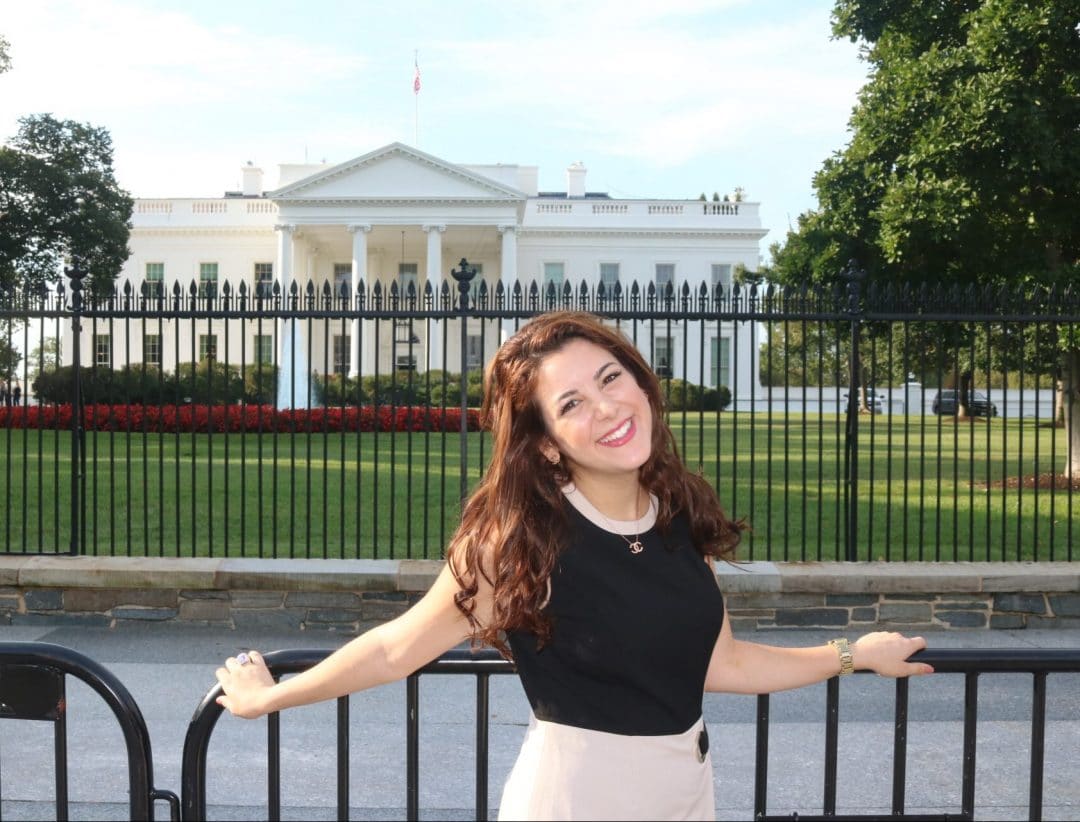Student Spotlight: Melody Zargari
Melody Zargari returned from one of the most exclusive internships in the country: the White House Internship Program.
Learn more about Melody, her passion for politics, and her experience working at the nation’s most famous address.
Name: Melody Zargari
Hometown: Niceville, FL
Major: General Business
Year: Senior
Student Organizations/Activities: Freshman Leadership Council (Member 13-14, Director of Student Government Outreach 14-15, Director of Diversity Affairs 15-16); Student Government Cabinet (15-16); Heavener Leadership Challenge (14-15); MentorUF (14-15)
1. Why did you choose to attend UF and Warrington?
Zargari: I wanted to attend an institution that would dually challenge me intellectually while providing the support and community I desired. I actually transferred into Warrington during the spring semester of my freshman year because I wanted to diversify my policy- and government-focused interests with concrete, business-oriented skills.
2. Why did you decide to pursue the BABA/General Business major?
Zargari: I chose General Business because I wanted to build a strong foundation for a wide range of future career possibilities. I appreciate the broadness of the major, because I can tailor it to almost any profession or graduate program. Also, the areas of specialization were a huge selling point! The ability to focus on law within business has been one of the most rewarding aspects of my degree.
3. How has your time at Warrington impacted you?
Zargari: The investment of professors, advisors, and peers in the quality of my education has instilled in me the confidence to succeed after graduation. While my politically-centric career path is certainly unconventional for a business student, I’ve always felt included and valued in the strong Warrington community.
4. What has been your favorite experience or memory so far at Warrington?
Zargari: My favorite memory is definitely the sense of camaraderie developed during one notoriously difficult business course. While I certainly didn’t enjoy them at the time, I can now fondly reflect on many caffeine fueled all-nighters with some of my best friends, and appreciate how hard we worked to survive that semester.
5. Why did you apply to the White House Internship Program?
Zargari: I have a consummate desire to become the best version of myself–so that I can become the best public servant possible. I knew this experience would be a transformative one, and I owe it to the people who’ve invested in me, and the people I hope to one day serve to take every opportunity to improve myself.
6. How was your experience in the Program?
Zargari: I could not have asked for a more edifying or fulfilling experience. The work I had a hand in felt purposeful, and the members of the Administration I interacted with inspired me to ground my goals in my core values. Serving the President I have admired since he took the stage at the Democratic National Convention when I was 9 years old was truly the honor of a lifetime.
7. What were your duties at the White House?
Zargari: The White House is not a stagnant place and the tasks were different every single day. Many of my long-term responsibilities, however, were centered around facilitating educational programs featuring senior White House staff, and implementing a social media case study to analyze communication trends between millennials and government. The one thing I can conclusively say is I ran—every day (in heels)—all over the White House and Executive Office Building. They really keep the interns busy, and we loved every second of it.
8. You’ve also interned at the U.S. Senate, the Council on Foreign Relations, and in the U.S. federal court system. What has attracted you to the government/political field?
Zargari: Civic engagement is of paramount importance to the security of our republic, and we need dedicated public servants who prioritize people over power. I’m drawn to government work because it hosts the potential to positively impact the lives of every citizen. While many people believe Washington to be a petri dish of corruption and inaction, I’ve come to know it as a hopeful place where dedicated patriots coalesce to fight for their vision for America.
9. What advice do you have for students searching for meaningful experiential learning opportunities?
Zargari: Establish a brand for yourself and become the very best version of that brand. Don’t concern yourself with what other people are doing, and don’t allow yourself to become distracted by their success. Pour all your efforts into cultivating your talents. That’s how you’ll differentiate yourself in applications, interviews, and on the job.
10. What are your career plans?
Zargari: After graduation, I am moving to Boston to join Teach for America as a high school math teacher. After two years in the classroom, I will hopefully attend law school and return to Washington to implement necessary changes in our nation’s education policies. My goal is to restructure and diversify our curricular models to foster perspective and empathy in our students, thus creating a new generation of open-minded, global citizens. After that, I would love to practice international human rights law to establish education as a fundamental human right, and work assiduously to ensure that right to every child in the world.
11. Tell us something about yourself that most people don’t know.
Zargari: I eat copious amounts of carrots and take vitamin A supplements because I’m terrified of having poor eyesight.
12. How do you spend your time when not studying?
Zargari: I spend more time than I’d care to admit reading political journals, watching the news and listening to NPR. Actually, I spend all my time doing these things, even when I should be studying.
13. If you had a million dollars, how would you spend it?
Zargari: First, I would contribute to Facebook and Google’s joint effort to expand internet accessibility in the developing world. Then, I would work with Apple and Samsung to provide tablets to adolescent girls in the countries where internet access had been installed. Over 47% of girls in Sub-Saharan Africa and 83% in East Asia are prohibited from physically attending school, so this solution brings a virtual classroom to them. Educated girls are less likely to become victims of FGM, sexual violence, and child marriage, and are exceedingly more likely to contribute to their nation’s GNP.
14. What song has been stuck in your head recently?
Zargari: The song that plays during the opening credits of The West Wing.
15. Which social media platform could you not live without?
Zargari: I like to think I could live without any social media, but Facebook would probably be the hardest to give up. Mainly because every time I post a photo, my grandma thinks I’m sending it just to her and she gets very excited.




